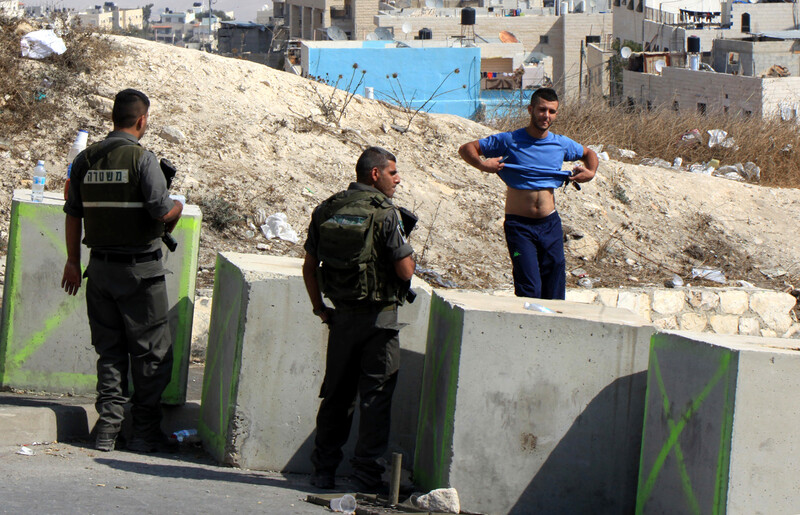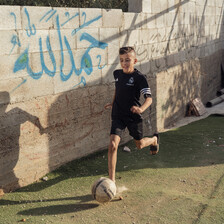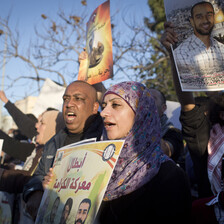The Electronic Intifada 22 November 2019

Two Israeli border guards guard what was a newly erected checkpoint at the exit of Issawiyeh in 2015. Over the past months, an even more aggressive Israeli security force presence in the occupied East Jerusalem neighborhood has caused growing tensions.
APA imagesIt’s constant danger.
Amin Barakat doesn’t mince his words. The 50-year-old resident of the East Jerusalem neighborhood of Issawiyeh said life in the area was not safe.
Not because of crime. Because of the police.
“We feel constantly in danger. The Israeli police are everywhere. We’re not safe on the streets, in our schools, or even in our homes,” Barakat told The Electronic Intifada.
“I am too afraid to even send my sons to buy something from the store or allow them to go outside alone. I’m scared they will be arrested.”
Issawiyeh was occupied by Israel in 1967. After the war, Israel unilaterally annexed the entire area of Jerusalem, including Issawiyeh, and as a result, the neighborhood ostensibly comes under Israeli civilian police jurisdiction.
Over the last several months, the area has faced a dramatic uptick in police activity that has thrown the neighborhood into chaos.
Blinking blue and red lights from Israeli police vehicles have become an everyday fixture on Issawiyeh’s streets, while police drones fly above – surveilling each move of the neighborhood’s residents.
Police searchlights pierce residents’ homes as Israeli officers conduct raids in the dead of night, breaking into homes and arresting residents. Police have said at various times that the police activity was due to everything from cracking down on “terror cells” to stone-throwers, but residents and rights groups vigorously dispute this and say the police activity is “unjustified.”
Police checkpoints and roadblocks, arbitrary arrests and routine harassment of Issawiyeh’s residents have brought tensions to a tipping point. Violent confrontations between angry residents, sometimes throwing stones, and security forces, including anti-riot and paramilitary border police units firing teargas and rubber bullets, have left hundreds of residents injured.
In July, about a month after the start of the police operations, Muhammad Obeid, 19, was shot and killed in Issawiyeh by the Israeli police during a protest against the police brutality, sparking three consecutive days of intense confrontations between police and Issawiyeh’s residents.
Residents were forced to close their businesses, they said, and the Issawiyeh parents’ committee, which normally concerns itself with more mundane pedagogical matters in the local area, called a neighborhood-wide school strike.
Parents were too scared to send their children outside the home amid what rights groups have called an “unprecedented” level of police activity in the area.
Arbitrary arrests and harassment
“The situation is unbearable,” Muhammad Abu Hummus, a local community leader, told The Electronic Intifada in a recent interview. “The police are here 24 hours a day. Parents are scared to send their children to school.”
“There is no justification for any of this. The police want to harass us for no reason,” he added.
This disruptive police operation in Issawiyeh began on 12 June, according to Amy Cohen, director of international relations and advocacy at Ir Amim, an Israeli non-governmental organization that documents and raises awareness on issues facing Jerusalem.
Cohen has been documenting developments on the ground in Issawiyeh and says residents have been complaining of daily police raids for five months now. Indeed, the village has suffered security raids and house demolitions for years, but the last months have been particularly invasive.
“Not only has there been a hostile armed police presence on the streets for months, you also have the blatant harassment of the residents. You have a complete disruption of daily life within the community,” Cohen told The Electronic Intifada.
Israeli forces have set up “completely arbitrary” checkpoints and police blockades at random times on the main road artery in the already congested neighborhood, Cohen said, blocking the main entrance and exit of the community. The checkpoints and blockades have “created all-out chaos throughout the neighborhood,” she said.
On top of this, Israeli police have targeted residents with “random and arbitrary” ticketing – for instance, for not parking their cars properly, Cohen said. In other instances, officials from the Jerusalem municipality, escorted by police, have ticketed shop owners for opening at certain hours or having a stand or structure outside their shop that the officials say requires a permit.
An “aggressive” police campaign, which includes arresting residents walking on the streets and night raids, has resulted in about 500 residents being arrested since June, including children. According to Cohen, only about 20 of those arrested have had charges filed against them.
“That’s a huge discrepancy,” Cohen said, noting that these numbers show the arrests being carried out are random and arbitrary. Similarly, all of the children arrested, including a nine-year-old child, have been released within 24 hours with no charges brought.
According to Barakat, residents are also being forced to pay hefty fines following the arrests, even when no charges are filed against the individual. He noted that earlier this month police arrested a 15-year-old in Issawiyeh for the second time in one month. The child’s father has been required to pay nearly $1,500 in bail for each arrest of his son, Barakat said.
Neighborhood-wide school strike
Abu Hummus, who Israel has arrested numerous times for heading nonviolent resistance to Israeli policies in occupied East Jerusalem, told The Electronic Intifada that the conditions imposed by the aggressive police presence sparked concern among parents who were preparing for the start of the school year.
As a result, the Issawiyeh parents’ committee declared that a neighborhood-wide strike covering nine local schools would be launched at the start of the school year if police could not guarantee that police forces would be off the streets during the hours children commute to and from school.
Abu Hummus, along with two members of the parents’ committee, was arrested in August for calling the strike. Abu Hummus was taken from his bed in the middle of the night and was accused of “incitement and support of terrorism.”
All three were released a few days later. Before school started, the committee, police and Jerusalem municipality were able to come to a verbal agreement, which avoided the strike.
According to Cohen, when school doors opened, there was a “periodic reduction” of police activity in the neighborhood. But it did not take long for the security forces to violate the agreement and resume the disruptive operations.
Earlier this month, on 2 November, the residents reached a breaking point after Israeli police raided a local high school and arrested on the school’s property a 16-year-old student accused of throwing stones at police. According to local media, confrontations erupted as other students threw chairs at the police, who then shot stun grenades inside the school grounds.
The next day, the parents’ committee declared a neighborhood-wide school strike affecting some 4,500 students from ages three to 18.
“We called the strike to save our children’s lives,” Barakat, a father of seven, told The Electronic Intifada. “Their lives are endangered. It wasn’t a choice for us. We need to ensure our children are protected.”
On 4 November, the police responded by arresting the same two parents’ committee members who had been arrested in August. They were released the next day, Cohen said, but slapped with a seven-day ban from entering Issawiyeh.
Losing hope
Residents held a demonstration on 5 November while the parents’ committee attended another meeting with the Jerusalem municipality and police officials. Another verbal agreement was reached, ending the strike, which Barakat said included forming a WhatsApp group involving the committee, municipality and the police to increase communication between the parties.
However, just two days later, according to Cohen, the police again resumed their activities during school commute hours and went even further by claiming no such agreement had been reached. Barakat said the police soon left the WhatsApp group.
“This set off a wave of the most intense and escalated police operations that we’ve seen since June,” Cohen said. Israeli police dramatically increased the number of forces on the ground in Issawiyeh, and earlier this month, on 9 November, Issawiyeh “turned into an all-out war zone,” she said.
Confrontations with dozens of police forces consisted of “unprovoked assaults on residents, horrific harassment and brutality, and the use of rubber bullets, tear gas and stun grenades,” Cohen added.
Dozens of residents were injured, including Abu Hummus, during the confrontations. A video of the incident, provided by a resident, shows Abu Hummus on his back coming back into consciousness with blood dripping from his head.
An eight-month-old infant also sustained injuries from tear gas inhalation while he was in his family’s home.
Cohen says residents are losing hope in the situation. “They have come to the point of feeling completely despondent,” she said. “We’re talking about five months of daily police operations that have completely disrupted their lives and those of their children – and there’s still no end in sight.”
Israeli activists and organizations have also come on the scene to stand in solidarity with the neighborhood, but their advocacy measures have done little to curb the increase of police activity in the community.
In a recent newsletter, Ir Amim condemned the police’s “blatant abuse of power” and noted that Issawiyeh residents, having failed in appeals to Israeli officials, are now calling for a “concerted international intervention” to bring an immediate end to the police operations “in order to restore normative life to the neighborhood.”
Barakat and Abu Hummus told The Electronic Intifada that the police have not informed Issawiyeh’s residents as to why such police activities are being carried out.
Spokespeople for the Israeli police and Jerusalem municipality did not respond to multiple requests for comment.
‘New stage’ of oppression in Jerusalem
Cohen told The Electronic Intifada that the police have claimed at certain times over the last several months that the raids were in order to crack down on “terror cells” or on residents throwing rocks, firebombs and Molotov cocktails at a road leading to the illegal settlement of Maaleh Adumim.
Based on Ir Amim’s investigations, there have been “very few” instances of stone-throwing or related events, Cohen said.
“There is no explicit reason why these operations have been carried out now for five months. There’s no justification whatsoever.”
The police have been given “carte blanche to operate however they see fit,” Cohen said, adding that the operation is being headed by Jerusalem Police Commander Doron Yedid. “He [Yedid] wants to come down with a heavy hand to suppress the neighborhood for no apparent reason,” Cohen explained.
“There has been little to no intervention by other authorities. There’s no proper governance and no proper accountability for police behavior. The residents are basically left alone to deal with unprecedented police brutality in their community.”
Barakat says he believes Israel “just wants to make life intolerable for us in order to push us out of Jerusalem.”
Rights groups have long pointed out that Israel’s discriminatory policies in East Jerusalem – which include routine home demolitions, discriminatory allocation of building permits, and the eviction of Palestinians from their homes for the benefit of Israeli settlers – are aimed at driving out Palestinians from the city.
With over 70 percent of Palestinian families in occupied East Jerusalem living below the poverty line, if life becomes too expensive, they have little choice but to move to congested Jerusalem neighborhoods on the other side of Israel’s separation wall or into the West Bank.
After Israel occupied East Jerusalem in 1967, Palestinians were not given Israeli citizenship, but were instead issued permanent residency permits, which can be revoked by Israel for a variety of reasons, including insufficient loyalty to the State of Israel.
Since 1967 and until 2017, nearly 15,000 Palestinians had their Jerusalem IDs revoked and were expelled from Jerusalem.
Issawiyeh has faced draconian police actions previously. There is a long tradition of community organizing in the neighborhood, and activism against Israel’s occupation remains strong. But Cohen says that past operations have never been this “endless and incessant.”
“This is a new stage of oppressive policies leveled against the Palestinian population in Jerusalem,” Cohen told The Electronic Intifada. “It’s a means to further displace and dispossess Palestinians.”
“They [Israel] want to drive whatever resistance and community organizing still exists in Issawiyeh straight into the ground.”
Jaclynn Ashly is a journalist based in the West Bank.





